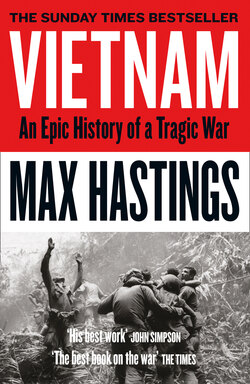Читать книгу Vietnam - Max Hastings - Страница 11
Note on Styles Adopted in the Text
ОглавлениеViet Nam is represented thus by its own people; in the interests of accessibility, however, I sustain the Western custom of using Vietnam, just as I render Ha Noi, Sai Gon, Dien Bien Phu, Da Nang and Viet Cong as single words.
The Vietnamese language makes extensive use of tone marks. I omit these in my text, but in the bibliography and index all proper names are appropriately accented.
Vietnamese names are commonly triple-barrelled, with the family name coming first, and I have adhered to this convention. Many Westerners are bewildered by the profusion of Vietnamese called Nguyen, but this is an accident beyond my undoing.
Wherever possible without forfeiting coherence I omit province names, to avoid crowding the narrative with geographical detail.
Translations often yield stilted prose. When quoting from foreign-language documents and memoirs in all my books, I respect Dryden’s admonition that a translator ‘should not lackey behind his author, but mount up beside him’. Thus, I seek to convey Vietnamese and French conversations in colloquial English.
‘African American’ is a modern term; in the Vietnam era, the word ‘black’ was used, and thus I retain it here. I cite an American’s race only where this seems relevant.
Ranks attributed are those held at the time of episodes described.
North and South Vietnam are capitalised thus when referenced as separate states, but lower-cased as north and south when the country was unified pre-1954 and post-1975.
All the combatants measured distances metrically. I nonetheless adopt feet, yards and miles, even in direct quotations.
The colloquial phrase for joining South Vietnam’s communist guerrillas was ‘ra bung’ which meant ‘going out into the marshes’, rather as some French World War II Resistants designated themselves maquisards, because they sought refuge in the maquis wilderness. Vietcong and its abbreviation ‘VC’ were South Vietnamese slang terms, but too familiar not to retain here.
American spellings are used in quoted speech by Americans, or in a conspicuously American context, for instance ‘secretary of defense’.
In thematic sections – notably, about the experience of combat – personal experiences from different periods of the war are sometimes merged, where this does not distort their significance and validity.
Timings of military operations are given by twenty-four-hour clock, but otherwise in accordance with twelve-hour civilian practice.
No attempt seems plausible to set a value upon the South Vietnamese piaster against the US dollar, since chronic inflation and unrealistic official exchange rates render no comparison valid for more than a short period of the wartime era.
